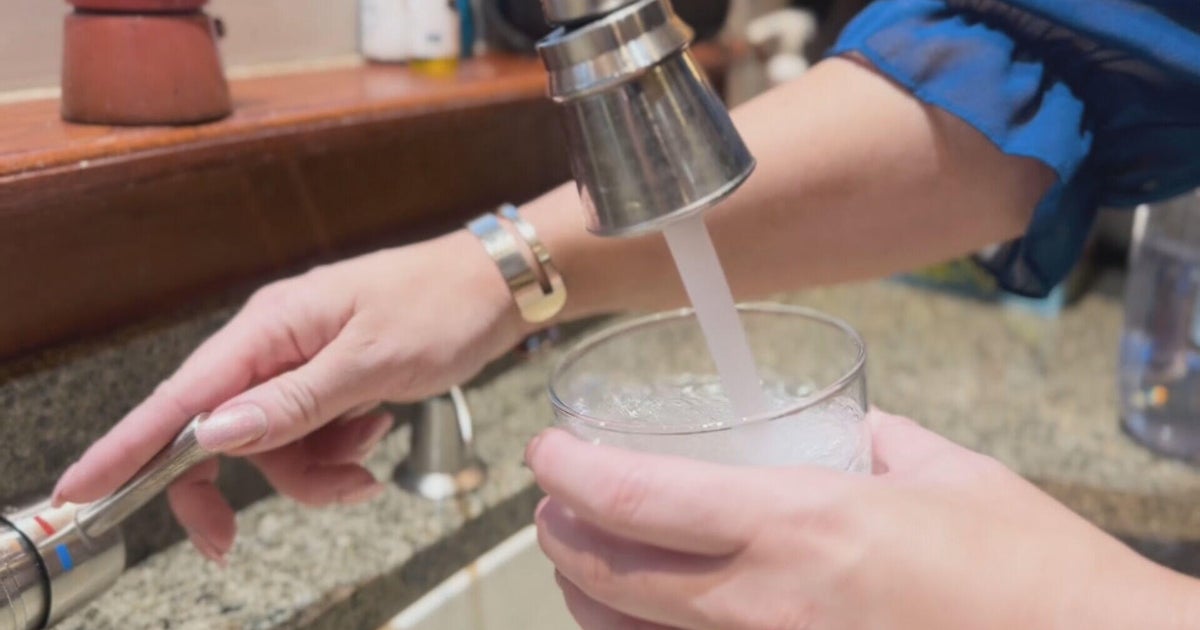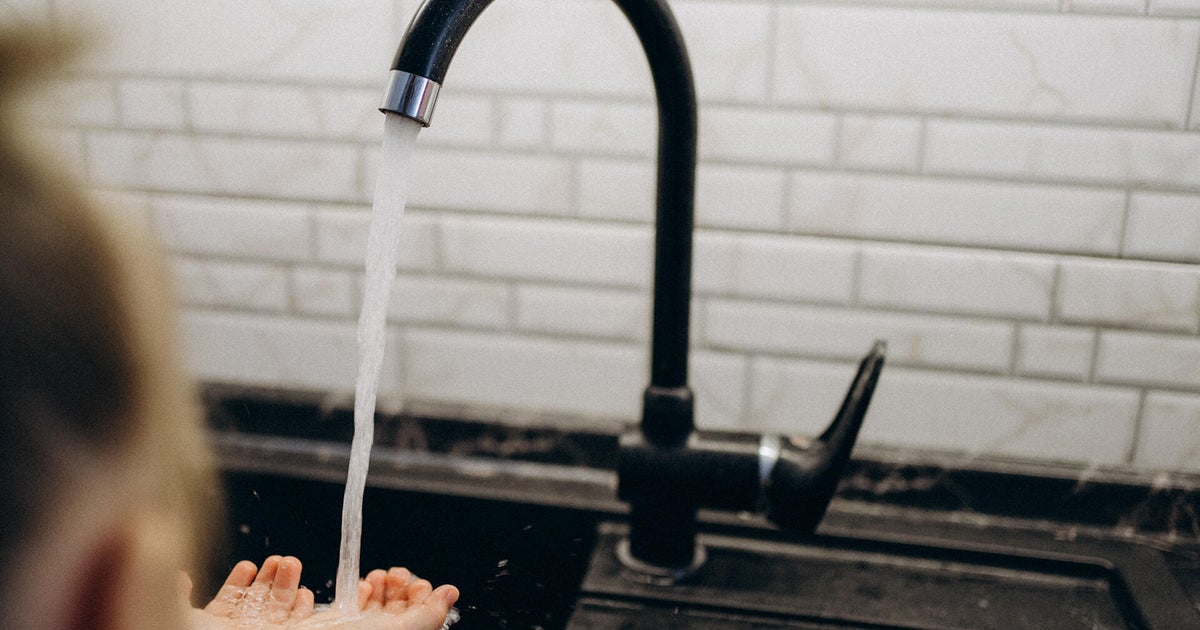How much water should you drink a day? And other hydration questions, answered by experts
As sweltering temperatures grip the country, hydration is top of mind — but how much water should you be drinking? According to experts, it's likely more than you may think. But they also warn against too much of a good thing.
"Our bodies are made up of mostly water — that has to tell you something," Dr. Alexa Mieses Malchuk, a family physician with membership-based primary care practice One Medical, told CBS News of the importance of water.
Water plays several important roles in how our bodies function, from regulating our temperature to lubricating joints and protecting organs and tissues.
A study from earlier this year even found people who get proper hydration may be less likely to show signs of aging and chronic illnesses.
To make sure you're keeping up with your water levels, we asked experts for answers to your most highly-searched hydration questions.
How much water should you drink a day?
Most people have heard of the "8 cups a day" guideline, but Mieses Malchuk says that's just a general rule of thumb. In actuality, your body may need more depending on certain factors.
"The truth is that how much water a person needs is a little bit more complicated," she says. "It's actually based on someone's body size, how active they are, what they're eating and even the weather."
For example, if it's warmer and more humid outside, you're likely need more water.
Eight cups, a total of 64 ounces, "is usually a good starting point as long as people recognize that they may in fact need more," she adds.
According to the Institute of Medicine of the National Academies, daily water recommendations range from 2.7 to 3.7 liters, or 91 to 125 ounces. But that doesn't all have to be from glasses of water; it also includes water intake from other beverages and food.
How much water is too much?
It is possible to drink too much water, but it's not a common problem.
However, too much water or other fluids, such as sports drinks, can cause a medical emergency called hyponatremia, also known as water poisoning or water intoxication. This happens when your body experiences an imbalance of electrolytes.
The body's water levels rise and cells swell as your body tries to regulate the concentration of electrolytes, which can cause health problems, Dr. Mahesh Polavarapu, medical director of the emergency department at New York-Presbyterian Westchester, recently told CBS News.
"If you have too much water, it's going to basically push that water into cells to kind of balance out that sodium and other electrolyte concentrations," Polavarapu said. "So as that happens, your brain cells and other cells in your body start to swell."
In extreme cases, this can even be fatal.
The Centers for Disease Control and Prevention advises people not to drink more than 48 ounces, or 6 cups, per hour.
But for most healthy adults, "This is not something you should be worrying about; you should be drinking as much water as you feel that's necessary," Polavarapu said.
What is the best water to drink?
"The best liquid to consume for hydration is just plain clean water," Mieses Malchuk says, adding that doctors may have different recommendations for people with certain medical conditions or lifestyle factors like being an elite athlete.
The "clean" part of this can be tricky — according to a recent study, almost half of the United States' tap water is estimated to contain PFAS or "forever chemicals."
The chemicals, used in non-stick cookware, stain-resistant products and other items, have been linked to higher risk of a number of health problems, including certain cancers.
The Environmental Protection Agency is working towards establishing and regulating legally enforceable levels of these chemicals in order to complement state efforts to limit PFAS compounds.
To ease concerns about potential contaminants, some consumers are turning to filters for their drinking water.
Is coconut water good for you? What about flavored waters?
When you veer away from plain water, Mieses Malchuk says it can get complicated, as certain prepackaged types of fruit juice-enhanced flavored waters can have additives, food coloring, sugar or artificial sweeteners.
Coconut water is popular, but research has also shown that it doesn't do a better job at hydrating you than regular water. Mayo Clinic experts note that coconut water does have electrolytes, including potassium, sodium and manganese, which can help replenish those lost through sweating.
If you're someone who struggles to drink enough water, instead of reaching for packaged fruit waters for variety, Mieses Malchuk recommends putting fresh fruit in your plain water.
"That is a natural way to add flavor without any additional sugar," she says.
Is sparkling water good for you?
Sparkling water products are mostly a matter of preference, Mieses Malchuk says, but she does caution that they have higher acidity levels than plain water.
"With carbonated water you also have to be aware that it is a little bit more acidic. So for people who are consuming carbonated beverages, irrespective of their sugar content, you have to worry about wearing away the enamel on your teeth," she explained.
Is alkaline water good for you?
For most people, alkaline water, which has a higher pH level than that of plain tap water, is not better than plain water, according to the Mayo Clinic.
"Proponents say that it can neutralize acid in your bloodstream. Some say that alkaline water can help prevent disease, such as cancer and heart disease. However, more research is needed to verify these claims," the Mayo Clinic's website notes.
As Mieses Malchuk added: "By and large, you cannot go wrong with just plain old water."
Is cold water bad for you?
Any temperature of water that's comfortable is safe to consume, Mieses Malchuk assures us.
"As long as it's not so hot that you're burning yourself, you can drink water on a temperature spectrum from something like hot tea all the way to ice cold water — all of that's just fine," she says.
Gastroenterologist Dr. Brian Weiner agrees the choice is mostly about personal preference, according to a post he wrote for the Cleveland Clinic.
"In terms of studies or science about this, it is relatively limited," he notes.
In some research involving athletes and hydration, Weiner says, athletes tended to favor cold tap water, which seemed to cool them down faster.
But whatever temperature water you like will do the job of hydration.
"There's something very comforting about hot beverages," Weiner writes. "...If you have a cold and the hot steam gets into your nasal passages, that can offer some relief but that's not a hydration issue."
-Aliza Chasan contributed to this report.



